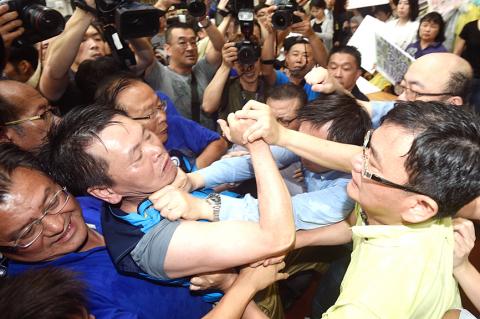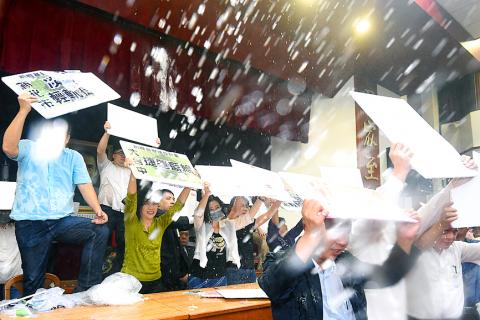All hell broke loose at the legislature yesterday after the Chinese Nationalist Party (KMT) caucus bombarded Democratic Progressive Party (DPP) lawmakers with water balloons, flour and eggs, prompting the DPP caucus to rush budget proposals for the Forward-looking Infrastructure Development Program and 126 motions through committee review.
KMT caucus members first tried to filibuster the proceedings.
However, as soon as the last KMT lawmaker finished speaking, DPP Legislator Wang Jung-chang (王榮璋), who chaired the meeting, instructed an emcee to read the motions tendered by the DPP, the New Power Party (NPP) and the People First Party (PFP).

Photo: Liao Chen-huei, Taipei Times
KMT lawmakers had arrived armed with bags full of water balloons for such a moment and they began to hurl them at the DPP lawmakers at the rostrum.
Water balloons flew across room, hitting several fluorescent lights before smashing against the proscenium above the rostrum.
Water trickled down onto the DPP legislators, some of whom then donned raincoats, while others tried to fend off more balloons with placards while getting soaked.

Photo: Liao Chen-huei, Taipei Times
A bag of flour was also thrown and exploded on the board.
While most KMT lawmakers appeared to be aiming for the proscenium, KMT Legislator Chang Li-shan (張麗善) took aim at DPP Legislator Ho Hsin-chun (何欣純), triggering a scolding from Ho.
KMT caucus whip Lin Te-fu (林德福) produced an egg and threatened to throw it.
“Lin Te-fu. Do not throw eggs. Otherwise, you are looking for a fight,” DPP Legislator Chuang Ruei-hsiung (莊瑞雄) said.
KMT Legislator Lin Wei-chou (林為洲) threw the egg instead, but it was Lin Te-fu and KMT Legislator Sra Kacaw, who were standing nearby, who had to deal with the fallout.
DPP lawmakers Chen Ou-po (陳歐珀) and Chiu Chih-wei (邱志偉) charged at Lin Te-fu, pinning him to the floor along with Sra.
Waves of scuffles ensued after the men got back to their feet.
With the meeting descending into total chaos, Wang put to a vote — in the form of a roll call — a DPP motion to send the 126 motions to cross-caucus negotiations next month.
The motion was backed by the DPP caucus, which has the legislative majority.
That angered several KMT lawmakers, who pushed over a desk and tried to drive it toward the rostrum like a siege ram, only to be vigorously blocked by DPP lawmakers.
Lin Wei-chou said that the KMT’s next mission would be to freeze as many unreasonable budget proposals linked to infrastructure development program as it can.
The DPP caucus criticized the KMT’s obstruction and its combative tactics.
“As hot as the weather is, this is the legislature, not a water park,” DPP caucus chief executive Yeh Yi-chin (葉宜津) said.
The “farce” staged by the KMT impeded lawmakers, including those from the DPP, PFP and NPP, from questioning, supervising or downsizing the infrastructure budgets, while allowing them to receive the approval of a cross-committee review without any discussion or modification, she said.
Only 16 KMT lawmakers — less than half of the KMT’s 35 legislators — attended the review, suggesting that most KMT lawmakers supported the infrastructure program, Yeh added.
“The KMT called three caucus meetings, only to discuss whether they should use water balloons or eggs,” DPP caucus secretary-general Lee Chun-yi (李俊俋) said. “Is this the KMT that KMT chairman-elect Wu Den-yih (吳敦義) wants?”
The KMT’s boycott of the budget review was aimed to curry favor with staunch pan-blue supporters, whose opposition to the infrastructure program is intense, Lee said.
Additional reporting by Chen Wei-han

Chinese Nationalist Party (KMT) Chairman Eric Chu (朱立倫), spokeswoman Yang Chih-yu (楊智伃) and Legislator Hsieh Lung-chieh (謝龍介) would be summoned by police for questioning for leading an illegal assembly on Thursday evening last week, Minister of the Interior Liu Shyh-fang (劉世芳) said today. The three KMT officials led an assembly outside the Taipei City Prosecutors’ Office, a restricted area where public assembly is not allowed, protesting the questioning of several KMT staff and searches of KMT headquarters and offices in a recall petition forgery case. Chu, Yang and Hsieh are all suspected of contravening the Assembly and Parade Act (集會遊行法) by holding

PRAISE: Japanese visitor Takashi Kubota said the Taiwanese temple architecture images showcased in the AI Art Gallery were the most impressive displays he saw Taiwan does not have an official pavilion at the World Expo in Osaka, Japan, because of its diplomatic predicament, but the government-backed Tech World pavilion is drawing interest with its unique recreations of works by Taiwanese artists. The pavilion features an artificial intelligence (AI)-based art gallery showcasing works of famous Taiwanese artists from the Japanese colonial period using innovative technologies. Among its main simulated displays are Eastern gouache paintings by Chen Chin (陳進), Lin Yu-shan (林玉山) and Kuo Hsueh-hu (郭雪湖), who were the three young Taiwanese painters selected for the East Asian Painting exhibition in 1927. Gouache is a water-based

Taiwan would welcome the return of Honduras as a diplomatic ally if its next president decides to make such a move, Minister of Foreign Affairs Lin Chia-lung (林佳龍) said yesterday. “Of course, we would welcome Honduras if they want to restore diplomatic ties with Taiwan after their elections,” Lin said at a meeting of the legislature’s Foreign Affairs and National Defense Committee, when asked to comment on statements made by two of the three Honduran presidential candidates during the presidential campaign in the Central American country. Taiwan is paying close attention to the region as a whole in the wake of a

OFF-TARGET: More than 30,000 participants were expected to take part in the Games next month, but only 6,550 foreign and 19,400 Taiwanese athletes have registered Taipei city councilors yesterday blasted the organizers of next month’s World Masters Games over sudden timetable and venue changes, which they said have caused thousands of participants to back out of the international sporting event, among other organizational issues. They also cited visa delays and political interference by China as reasons many foreign athletes are requesting refunds for the event, to be held from May 17 to 30. Jointly organized by the Taipei and New Taipei City governments, the games have been rocked by numerous controversies since preparations began in 2020. Taipei City Councilor Lin Yen-feng (林延鳳) said yesterday that new measures by